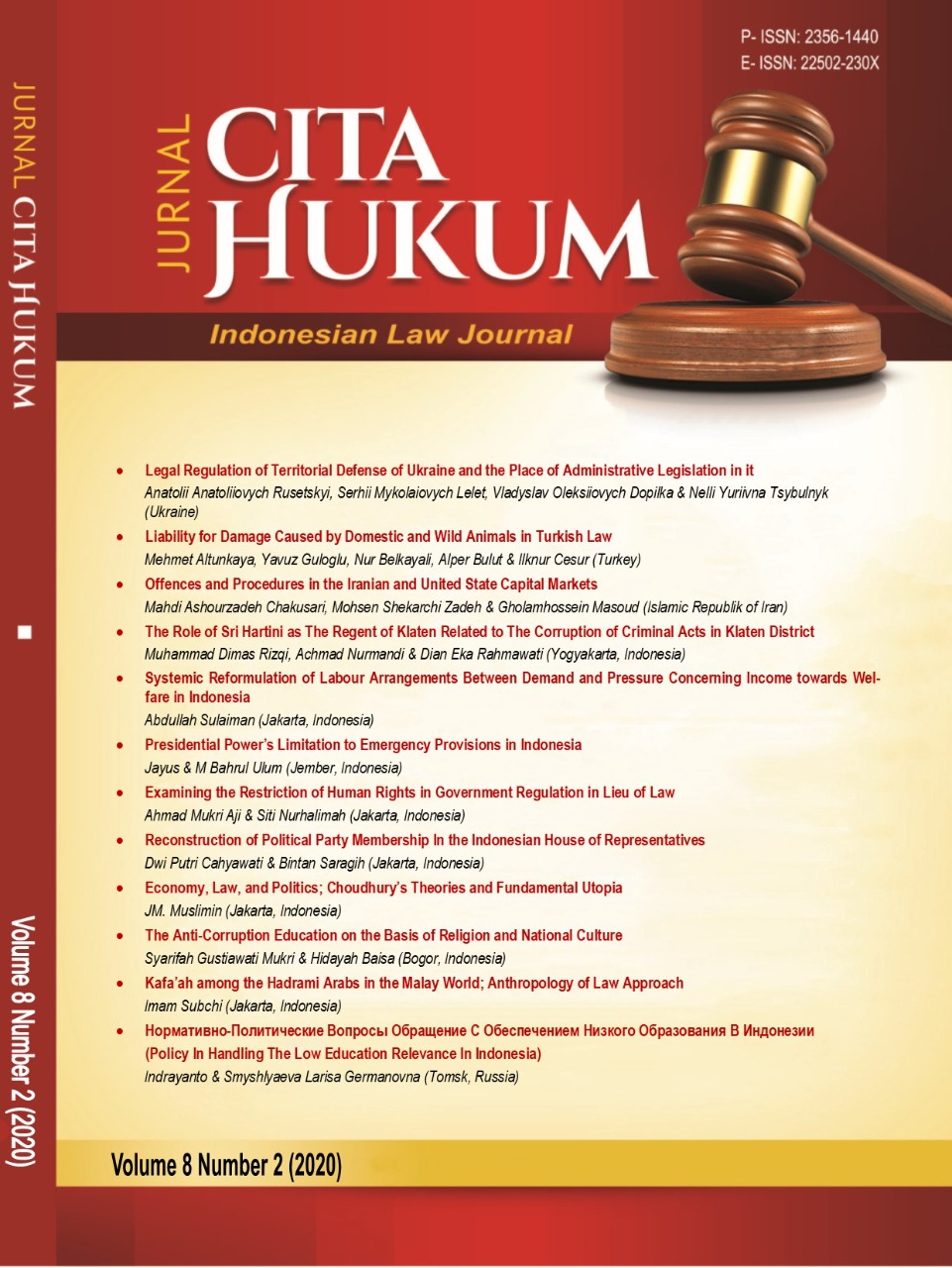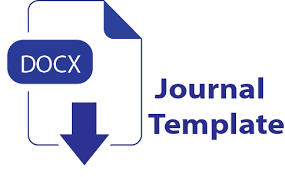Economy, Law, and Politics; Choudhury’s Theories and Fundamental Utopia
DOI:
https://doi.org/10.15408/jch.v8i2.16665Keywords:
historical-dialectical materialism, usury, exploitation, monotheism paradigmAbstract
Abstracts
Masudul Alam Choudhury agrees that fundamental thinking to construct a new knowledge base is needed when scientific and social conditions tend to be closed and monopolistic. The construction is expected to be able to dismantle the structural veil to find an alternative foundation and format that can be expected to realize social justice. For this reason, law, economics, and social paradigm can be effective instruments. In contrast to Choudhury, Karl Marx emphasized the existence of a new, rational-material awareness that dimensioned an economic struggle based on class consciousness, historical dialectics, and materialism as the choice of objectives above. This awareness can be grown contextually, by moving the oppressed to demand equality. So the legal, economic, and political foundations can change. While Choudhury focuses more on the transcendental dimension of the divine (tauhid paradigm) which is interpreted comprehensively and totally to dismantle the legal, economic, and social order. Thus, the legal, economic, and political infrastructure rests on fairness and productivity that remains competitive. The values that are in the divine foundation are arranged in the building of law and ethics (morals) to be integrated into the institution towards the desired reconstruction. However, Choudhury’s ideas remain normative and fail to be translated. It is too utopian.
Keywords: historical-dialectical materialism, usury, exploitation, monotheism paradigm.
Abstrak
Masudul Alam Choudhury sependapat bahwa pemikiran fundamental untuk membangun basis pengetahuan baru diperlukan ketika kondisi ilmiah dan sosial cenderung tertutup dan monopolistik. Pembangunan tersebut diharapkan mampu membongkar kerudung struktural untuk menemukan alternatif pondasi dan format yang diharapkan dapat mewujudkan keadilan sosial. Oleh karena itu, paradigma hukum, ekonomi, dan sosial dapat menjadi instrumen yang efektif. Berbeda dengan Choudhury, Karl Marx lebih menekankan adanya kesadaran material rasional baru yang berdimensi perjuangan ekonomi berdasarkan kesadaran kelas, dialektika historis dan materialisme sebagai pilihan tujuan di atas. Kesadaran ini bisa ditumbuhkan secara kontekstual dengan menggerakkan kaum tertindas untuk menuntut kesetaraan. Jadi landasan hukum, ekonomi dan politik bisa berubah. Sedangkan Choudhury lebih menitikberatkan pada dimensi transendental ketuhanan (paradigma tauhid) yang dimaknai secara komprehensif dan menyeluruh untuk membongkar tatanan hukum, ekonomi dan sosial. Dengan demikian, infrastruktur hukum, ekonomi dan politik bertumpu pada keadilan dan produktivitas yang tetap kompetitif. Nilai-nilai yang ada dalam landasan ketuhanan ditata dalam bangunan hukum dan etika (akhlak) untuk diintegrasikan ke dalam institusi menuju rekonstruksi yang diinginkan. Namun, ide Choudhury tetap normatif dan gagal diterjemahkan. Itu terlalu utopis.
Kata kunci: Materialisme Historis-Dialektik; Riba; Eksploitasi; Paradigma Tauhid
Аннотация
Масудул Алам Чоудхури согласен с тем, что фундаментальное мышление необходимо для создания новой базы знаний, когда научные и социальные условия имеют тенденцию быть закрытыми и монополистическими. Ожидается, что создание такой базы сможет демонтировать структурную завесу и найти альтернативные основы и форматы, которые, как ожидается, позволят реализовать социальную справедливость. Следовательно, правовая, экономическая и социальная парадигмы могут быть эффективными инструментами. В отличие от Чоудхури, Карл Маркс больше подчеркивал существование нового рационального материального сознания с измерениями экономической борьбы, основанными на классовом сознании, исторической диалектике и материализме как на выбранных выше целях. Это осознание можно усилить в контексте, мобилизуя угнетенных на требование равенства. Так что правовая, экономическая и политическая основы могут измениться. Между тем, Чоудхури больше сосредотачивается на трансцендентном измерении божественности (парадигма таухид – божественное единство), которая интерпретируется всесторонне и тщательно, чтобы разрушить правовой, экономический и социальный порядок. Таким образом, правовая, экономическая и политическая инфраструктура опирается на справедливость и производительность, которые остаются конкурентоспособными. Ценности, которые существуют в божественном основании, изложены в правовом и этическом (ахлакском) здании для интеграции в учреждения для желаемой реконструкции. Однако идеи Чоудхури оставались нормативными и не претворялись в жизнь. Это слишком утопично.
Ключевые Слова: Историко-Диалектический Материализм; Ростовщичество; Эксплуатация; Парадигма Таухид
References
Books
al Alan, Piero. Social Sciences Culture, Tran. Baqir Sarukhani. Tehran: Kiyhan, 1991.
al-‘Attas, Farid. “The Islamization of Knowledge: Interview With Farid Allattas.” Religioscope 2008.
al-Ghazali, Abu Ijmaid, al-Mustafa vol. 1. Cairo: al-Maktabah al-Tijariyyah al-Kubra, 1937.
al-Khaledi, Mahmud. Mahfum al-iqtisad fi al-islam. Beirut : Dar al-jillttabe va al-Nashr va al-Tozi, 1984.
Battaglia, Anthony, Toward a Reformulation of Natural Law. New York: Seabury press, 1986.
Blaug, Mark. The Methodology of Economics of How Economists Explain. London: Cambridge University press, 1994.
Bridgman, Percy Williams. The Logic of Modern Physics. New York: The Macmillan Co., 1947.
Caldwell, Bruce, Beyond Positivism. London: Allen & Unwin, 1982.
Capaldi, Nicholas, The Philosophy of Science: the Historical Development of Scientific Conceps and Their Philosophical Implications, London: Monarch Press, 1966.
Chalmers, Alan Francis, What is this Thing Called Science?: An Assessment of the Nature and Status of Science and its Methods, Brisbane: Univelsity of Queensland press, 2007.
Choudhury, Masudul Alam, Principles of Islamic Economy, Jurnal Islamic Studies (Islamabad) 21: 2, 1982.
Choudury, Masudul Alam, Islamic Political Economy : An Epistimological Approach, Jurnal Sosial Epistimology Review and Reply Collective, Vol. 3 No. 11 2014.
Edward, Paul. The Encyclopedia of Pholosophy. New York: Macmillian, 1972.
Eivazlou, Hossein and Hosseini, Seyyed Aqil, The Philosophy of Islamic Economics. Tehran: Imam Sadiq University, 2011.
Feyerabend, P. Against Method: Outline of an Anarchistic Theory of Knowledge, cited drom the 1970 edition of this book (p. 19) by Lawrence Boland, “Scientific Thinking without Scinentific Method”, in Blackhouse, 1994.
Fred Bell, John, A history of economic thought. New York: The Romaid Press, 1953.
Gilson, Etienne. The Unity of Philosophical Experience. Clifornia: Ignatius Press, 1999.
Hartnack, Justus. Kant’s Theory of Knowledge: An Introduction to the Critique of Pure Reason. Translated by Qulam Ali Haddad Adil. Tehran: Fikr Ruz, 2008.
Hausman, D. M. The Inexact and Separate Science of Economics. Cambridge: Cambridge University Press ,1992.
Hay, Colin. Political Analysis: A Critical Introduction London: Palgrave Macmillan, 2002.
Hempel, Carl Gustav. Philosophy of Natural Science. New York: Prentice-Hall, 1966.
Hospers, John. An Introduction to Philosophical Analysis. New Jersey: Pearson, 1996.
Hume ,David, A Treatise of Human Nature. Oxford: Clarendon Press, 1896.
Hume David, An Enquiry Concerning Human Understanding. London: Ocford University Press, 1999.
Hutchison, T. W. On Revolutions and Progress in Economic Knowledge. Cambridge: Cambridge University Press, 1978.
Ibn Khaldun. Muqaddimah. Beirut: Darolkotob al-Lobnani, 1982.
Jauhari, Wildan, Selayang Pandang Prinsip Ekonomi Islam, Jakarta: Rumah Fiqih Publishing, 2019
Margenau, Henry. The nature of physical reality. New York: MeGra-Hill, 1950.
Maritain, Jacques, the Rights of Man and Natural Law, trans. Doris C. Anson. Michigan: Charles Scriner’s Sons, 1943.
Menger, K, Principles of Economics, trans, Hoselitz, New York: University press, 1985.
Mill, J. S., Essays on some unsettled Question of Political Economy. New York: Kelley, 1968.
Mini, Piero V. Philosophy and Economics. Florida: University Florida, 1974. Mirakhor, Abbas. A Note on Islamic Economics. Jeddah: Islamic Research and Training Institute, 2007.
Mitchell. Wesley C,. “Thorstein Veblen.” In What Veblen Taught: Selected Writings of Thorsein Veblen, ed. Mitchell, Wesley, New York: Augustus M. Kelley, 1964.
Mohammad, Masudul Alam Choudury dan Lubna Sarwath, Sustainability by Interrelating Science, Society, and Economic in Embedded Political Economy – An Epistimological Approach, Rijeka (Croatia) : The Sistemic Dimension of Gobalization, InTech : 2011.
Qurbani, Qurdratullah “Causality from western empiricism viewpoint and its Critique from Transcedent Philosophy Viewpoint.” Andishih Nuwin Dini 9 2007.
Articels
al-Attas, Syed Muhamad Naquib, Prolegomena to the Metaphysics of Islam, Jurnal ISTAC Kuala Lumpur, 1995.
Rosdi, Muhammad Syukri Salleh dan Mohd Syakir Bin Mohd, Islamic Political Economy: A Special Reference to the Use of Tahaluf Siyasi in the State of Kelantan Malaysia, American International Journal of Contemporary Research Vol. 4, No. 5; May 2014.
Choudury, Masudul Alam, Islamic Economics and Finance Where Do They Stand?, Advances In Islamic Economics and Finance Proceeding of 6th International Conference on Islamic Economics and Finance, Jeddah : Islamic Research & Training Institute, 2007.
Dimyati, A, Ekonomi Etis : Paradigma Baru Ekonomi Islam, Jurnal Ekonomi Islam La Riba, Vol.1 No. 2, Desember 2007.
Rozalinda, Epistimologi Ekonomi Islam dan Pengembangannya pada Kurikulum Ekonomi Islam di Perguruan Tinggi, Jurnal Human Falah : Vol. 2 No. 1 Januari-Juni 2015
Choudury, Masudul Alam, Regulation in the Islamic Political Economy : Comparatif Perspectives, J.KAU Islamic Econ., Vol. 12 1420 A.H/2000.
Rosdi, Mohd Syakir Mohd, Nilai Ekonomi dan Nilai Politik Dalam Ekonomi Politik Islam, Proceedings ICIEF’15, Mataram, 25-27 of August 2015.
Choudury, Masudul Alam, Global ethics in the light of Islamic Political Economy, Int. J. Arab Culture, Management and Sustainable Development, Vol. 1, No. 1, 2008.
Jacob, Viner, “Mercantilist thought” in International Encyclopedia of Social Science, Vol. 4. New York : Macmilan, 1968.
Word wide Web
https://www.encyclopedia.com/arts/culture-magazines/choudhury-masudul-alam, diakses pada tanggal 19 Desember 2019 pkl. 04.36 WIB
https://www.igi-global.com/affiliate/masudul-alam-choudhury/253323, diakses pada tanggal 19 Desember 2019 pkl. 04.55 WIB












